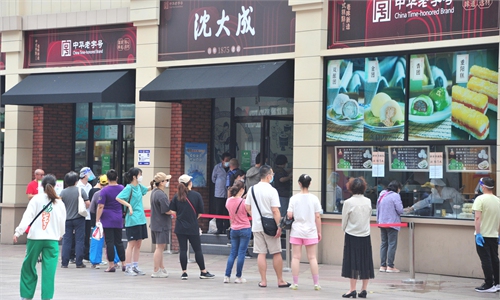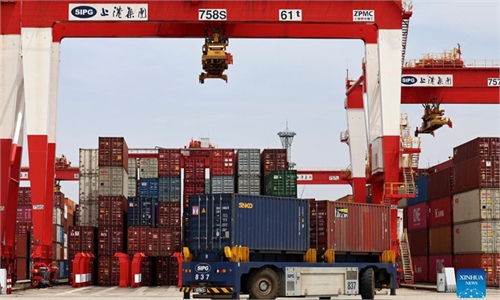
Illustration: Tang Tengfei/Global Times
The British chambers of commerce in China on Tuesday launched the British Business in China: Position Paper 2022. While pointing out the areas of opportunity for bilateral cooperation, the report is full of unnecessary excessive concerns over the business environment. The paper claims "uncertainty is denting business confidence and eroding China's position as attractive destination."At the launch event, Julian MacCormac, chair of the chamber, told the Global Times that although British businesses do remain optimistic about China's long-term outlook, there is a level of concern at the moment, which is leading business to either postpone or reduce their investments over the short term.
At present, Beijing and Shanghai, the two largest cities in China, have just emerged from the shadow of Omicron, and a nationwide economic recovery is well and truly underway. The operation of many foreign businesses in China may have not recovered to pre-epidemic level, but they should not become overly pessimistic. They should not be overly worried over the short-term difficulties in the Chinese market, or they may miss the chances that come with the economic recovery.
The report by the British chambers of commerce in China claimed that "uncertainty is eroding China's position as attractive destination," but a business confidence survey from China Council for the Promotion of International Trade (CCPIT) on Monday showed that foreign-funded enterprises have generally rated China's business environment as good, with 87 percent of foreign-funded enterprises claiming they would maintain or expand their operations in the market.
The data released by China's Ministry of Commerce earlier this month also showed that in the first four months, the country's actual use of foreign capital reached $72 billion, a year-on-year increase of 26.1 percent. It is particularly worth noting that during the period, the actual use of foreign capital in China's high-tech industries increased by 45.6 percent year-on-year.
The business confidence survey and the foreign investment data fully demonstrate that even as there were short-term difficulties caused by the epidemic, the confidence of foreign companies in the Chinese market has not been seriously weakened as some in Western countries have wrongly claimed.
In the latest round of epidemic, foreign companies are indeed worried about the impact of epidemic prevention and control measures on their business operations, but even at the most difficult moment of the epidemic, China was doing its best to maintain the supply chain and strike a balance between epidemic prevention and regular economic activity.
For example, the adaptive and dynamic measures such as a white list and closed-loop management in Shanghai have helped local companies successfully overcome the difficulties. After production resumed on April 19, Tesla's Shanghai Gigafactory delivered the first shipment of electric vehicles on May 11. From January to April, it had an output of 183,686 vehicles, an increase of more than 1.7 times compared with the same period last year.
Currently, the epidemic has been basically controlled. Foreign companies should have more confidence in the market, not the other way around.
The National Immigration Administration on Monday unveiled measures to facilitate production and operations for foreign-related businesses, in the latest push to steady and smooth supply chains and stabilize the foreign trade and investment landscape. Concrete moves like this will further facilitate foreign companies' operation recover from the impacts of the epidemic.
China's open attitude and attractiveness to foreign companies will continue. As China takes action to remove uncertainty, foreign companies will find that the Chinese market is still worthwhile to rely on and expand business.
The author is an editor with the Global Times. bizopinion@globaltimes.com.cn



